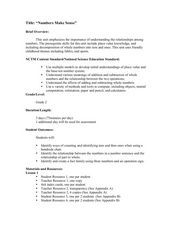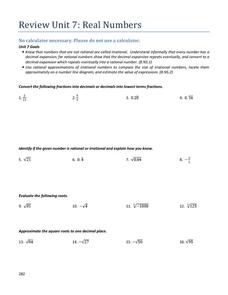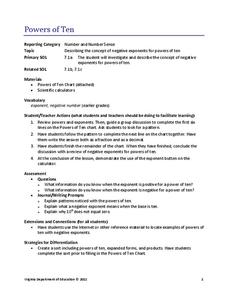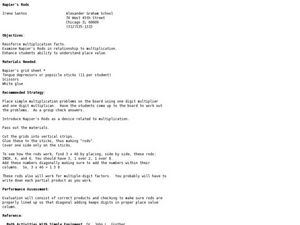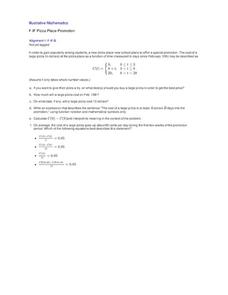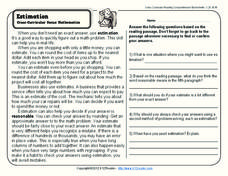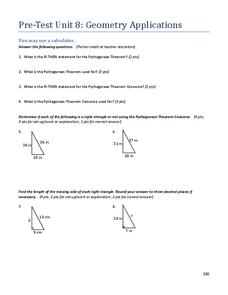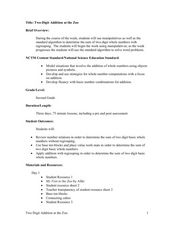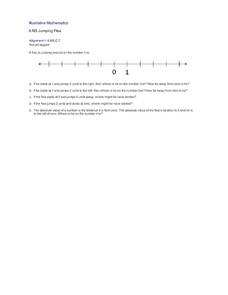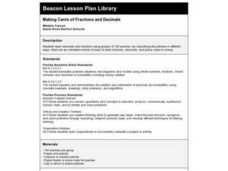Curated OER
Numbers Make Sense
Second graders explore number values by completing estimation problems in class. In this place value lesson, 2nd graders identify the use of decimals in numbers and how they relate to fractions or parts of a whole. Students utilize flash...
Curated OER
What's Missing?
Add a challenge for your young mathematicians' adventures in double-digit addition. Instead of simply computing sums in the 9 problems, they work backwards to fill in blanks among the addends. Resource makes a terrific extension or...
Charleston School District
Pre-Test Unit 7: Real Numbers
Don't be irrational! Use this pre-test to assess your classes' ability to work with all types of real numbers. The lesson asks learners to estimate value, evaluate roots, and order numbers. This begins a series of lessons on the real...
Charleston School District
Review Unit 7: Real Numbers
Provide pupils with problems to check their understanding of the concepts within the unit. The seven-part series of lessons covers concepts related to irrational numbers. Learners convert between fractions and decimals, estimate the...
Mathed Up!
Upper and Lower Bounds
Investigate how rounding affects values. Individuals watch a video about how to find the highest and lowest possible numbers that result in a given value when rounded to a certain place value. They finish by completing a worksheet of...
Virginia Department of Education
Powers of Ten
Investigate negative exponents of-ten. Pupils use the pattern of increasing powers of 10 to determine negative powers of 10. The scholars write the powers in expanded and product forms and make the connection to exponents using a...
Virginia Department of Education
Simplifying Square Roots of Whole Numbers
Simplify your life by using a resource on simplifying square roots. Pupils review square roots and calculate values of given radical expressions using a calculator. The instructional activity concludes by having them consider the results...
Curated OER
Napier's Rods
Young mathematicians explore the concept of multiplication using Napier's Rods. They use Popsicle sticks to create a 3D model of Napier's Rods. Pupils multiply multiple digit numbers using Napier's Rods.
Illustrative Mathematics
Pizza Place Promotion
The longer you wait to try the new pizza place, the more it's going to cost you! This real-world problem about how the cost of pizza varies with respect to time is a good example of how piecewise functions are used to describe...
Illustrative Mathematics
Adding Tenths and Hundredths
Learning to add fractions with different denominators presents a big hurdle for many young mathematicians. Simplify the process for learners with this series of practice problems involving the friendly fractions tenths and hundredths....
K12 Reader
Estimation
When is it a good idea to use estimation? Learn about estimation and rounding with a reading comprehension lesson. After kids read a passage about estimation, they answer five comprehension questions on the other side of the page.
Charleston School District
Pre-Test Unit 8: Geometry Applications
What does a squared and b squared make? C squared of course! The pre-test assesses eighth graders' knowledge of the Pythagorean Theorem, application of the Pythagorean Theorem, and finding volumes of solids.
Virginia Department of Education
Functions 2
Demonstrate linear and quadratic functions through contextual modeling. Young mathematicians explore both types of functions by analyzing their key features. They then relate these key features to the contextual relationship the function...
Curated OER
Two-Digit Addition at the Zoo
Your second graders explore two digit addition with regrouping. They will investigate problem solving strategies within the context of a trip to the zoo. Multiple resources and assessments are provided.
Curated OER
Expanded Form (E)
Put the power of place value in the hands of your eager learners. They assess 12 four-digit numbers and write each in its expanded form.
Maths Blog
Decimal Fractions: Tenths
Reading tenths as phrases (such as three tenths, or five and nine tenths), forth graders write down both fractions and decimal equivalents. There are 10 problems on this page, making it a nifty pop quiz! Assess math learners grasp of...
NASA
Food For Thought
Science can be quite tasty. A delectable unit from NASA shows learners why it's important to consider food, nutrition, and health in space. Four lessons explore the idea in great depth, including testing cookie recipes. Along the way,...
Curated OER
Numeracy Assessment
In this math worksheet, students are assessed on their basic math skills. Included are questions on multiplying and dividing by 10 and 100, place value, basic word problems, rounding, estimating and comparing numbers.
Agile Mind
Cake Weighing
An online set of four yummy questions addresses number sense for sixth graders. They place points on a number line, determine relative values, interpret absolute value, and apply their understanding to the weighing of cakes for a bakery....
Illustrative Mathematics
Jumping Flea
Mathematics minors consider the magnitude of a jumping flea as he hops from place to place. Through this exercise, they will investigate absolute values, as well as positive and negative rational numbers on a number line. The first page...
Balanced Assessment
Two Solutions
An assessment presents a variety of equations and inequalities. Pupils must find two solutions for each equation or inequality and determine whether there are only two, another finite number, or an infinite number of solutions...
Curated OER
Making Cents of Fractions and Decimals
Students explore decimals and fractions using groups of 100 pennies. By classifying the pennies in different ways, there are an unlimited number of ways to learn fractions, decimals, and place value in money. This is a good, hands-on...
Curated OER
Expanded Form (P)
Now here is a challenge that can be used toward the end of the second grade. Learners will assess 12 five-digit numbers and write each in expanded form. A great way to reinforce place value and build number sense.
Illustrative Mathematics
Regrouping
What number does 6 tens and 16 ones represent? How is it different from or similar to the number that 7 tens and 6 ones represent? This is the type of questions learners are asked to solve as a way to understand the concept of regrouping.


